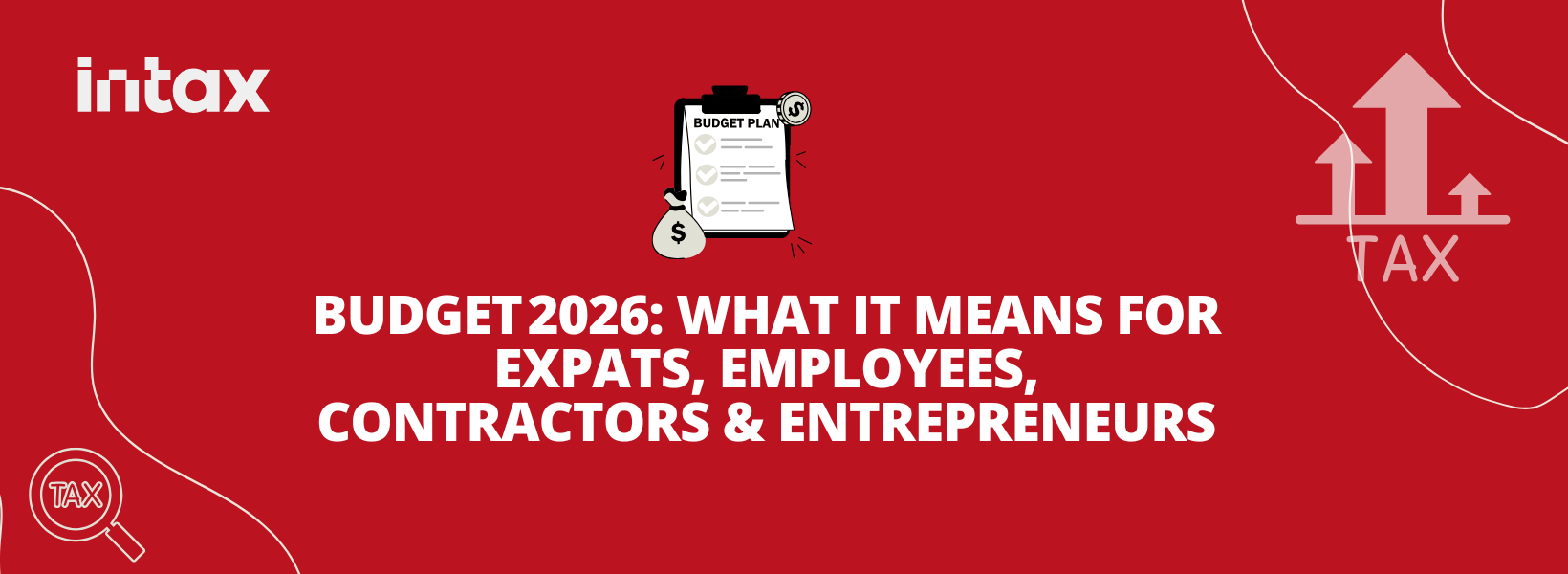As trusted accountants and tax advisors, Intax supports expats, employees, contractors, and entrepreneurs in navigating Ireland’s taxation system. Budget 2026, announced on 7 October 2025, introduces a mix of incremental changes and long-term structural measures that impact income, payroll, property, and business planning.
Here’s a detailed breakdown of the budget measures most relevant to our clients — and what you can do to optimise your tax position.
1. Income Tax, USC & Tax Credits
Income Tax Rates
- The 20% standard rate and 40% higher rate remain unchanged for 2026.
- Minor adjustments to the standard rate band may apply to protect against bracket creep, especially for employees whose pay has increased.
- High-income earners filing Form 11 or paying PAYE may need to plan for possible USC surcharge exposure.
Universal Social Charge (USC)
- The 2% rate band ceiling has been raised to €28,700, giving low- to mid-income earners a slight USC reduction.
- Higher rates (8%, 11%) continue to apply for higher earners.
- Contractors, self-employed individuals, and expats should consider how USC applies to combined employment and self-employment income.
Tax Credits
- Personal Tax Credit and Employee Tax Credit remain unchanged.
- Reliefs like mortgage interest relief and renters’ tax credit are extended.
- The R&D tax credit rate rises from 30% to 35%, benefiting companies and entrepreneurs investing in innovation.
2. Payroll, Wages & Pensions
Minimum Wage
- Increases to €14.15 per hour, benefiting employees on PAYE and contractors with temporary or part-time work arrangements.
PRSI
- Employee PRSI increases to 4.35%, while employer PRSI rises for higher incomes.
- Payroll administrators and accountants need to update calculations to reflect these new contributions.
Auto-Enrolment Pensions
- Automatic pension enrolment starts in 2026 for employees aged 23–60 not currently contributing to a workplace pension.
- Contributions: employee 1.5% of gross salary, employer matches.
- Expat employees and contractors working through companies should review options for voluntary pension contributions.
Benefit-in-Kind (BIK)
- Company cars, accommodation, and other perks may be taxed at higher rates.
- Employees, contractors, and entrepreneurs receiving non-cash benefits must review the impact on net pay and corporate deductions.
3. Property, Housing & Rental Supports
Mortgage Interest Relief
- Extended for another two years; available to homeowners with qualifying interest payments.
Residential Rental Income Relief
- Landlords continue to claim up to 20% of rental income (max €1,000 relief).
- Entrepreneurs with rental property as part of their portfolio should ensure they claim correctly.
Renters’ Tax Credit
- Extended until the end of 2028; beneficial for employees, expats, and contractors renting privately.
Housing & Infrastructure Investment
- €11 billion earmarked for housing, focusing on new builds and sustainable development.
- Entrepreneurs and property developers may find opportunities in government-backed projects.
4. VAT, Consumer Costs & Energy Supports
VAT Changes
- VAT on food, catering, and hairdressing services drops from 13.5% to 9% from mid‑2026.
- Energy VAT remains at 9% until 2030, helping to stabilise costs for businesses and households.
Energy & Home Retrofitting
- €558 million allocated for energy-efficient retrofitting of homes.
- Expats and employees with home offices may benefit indirectly through energy savings and grants.
5. Supports for Families & Social Welfare
- Core social welfare payments rise by €10/week.
- Working Family Payment (WFP) thresholds increase by €60/week.
- Child Benefit rises by €16/week for children aged 12+ and €8/week for younger children.
- Fuel Allowance eligibility is expanded.
Even for employees or contractors, these supports affect household income and may influence overall tax planning.
6. Impacts by Client Type
Expats
- Expanded USC 2% band slightly reduces tax burden.
- Pension auto-enrolment requires awareness to avoid overpayment or missed entitlements.
- Rental relief and energy grants provide additional indirect financial benefits.
Employees (PAYE)
- Lower USC rates for modest incomes improve take-home pay slightly.
- PRSI increase and BIK adjustments may offset gains.
- Minimum wage increase directly benefits lower-paid employees.
Contractors & Self-Employed
- Higher R&D credit and VAT changes affect profitability.
- Mortgage and rental reliefs remain available.
- Pension contributions through personal or company schemes require forward planning.
Entrepreneurs & Business Owners
- VAT adjustments, R&D incentives, and infrastructure investments create both challenges and opportunities.
- Payroll costs (PRSI + pensions) may increase; plan pricing and cash flow accordingly.
- Property and housing development tax treatment should be carefully considered.
7. Practical Steps for 2026
- Review payroll systems to account for new PRSI, USC, and pension auto-enrolment contributions.
- Check your BIK and benefits to understand tax implications.
- Maximise available reliefs and credits, including R&D, mortgage interest, rental relief, and energy grants.
- Plan cash flow and budgets with wage increases, VAT changes, and potential deductions in mind.
- Monitor legislative updates as the Finance Bill may refine measures announced in Budget 2026.
Why Choose Intax?
At Intax, we provide trusted taxation and accounting services to guide our clients through Ireland’s complex tax landscape. Our expertise supports:
- Expats navigating residency and tax obligations.
- Employees maximizing take-home pay and credits.
- Contractors optimising self-employed tax efficiency.
- Entrepreneurs & SMEs leveraging tax incentives, R&D credits, and business reliefs.
Budget 2026 contains opportunities and changes that, when properly managed, can make a significant difference to your finances.
Contact us today to review your situation and ensure you’re fully prepared for 2026.
Phone: 01 908 1250
Email: [email protected]





